Module 1 How to learn English Unit 1 Let’s try to speak English as much as possible.课件(51PPT无素材)
文档属性
| 名称 | Module 1 How to learn English Unit 1 Let’s try to speak English as much as possible.课件(51PPT无素材) | 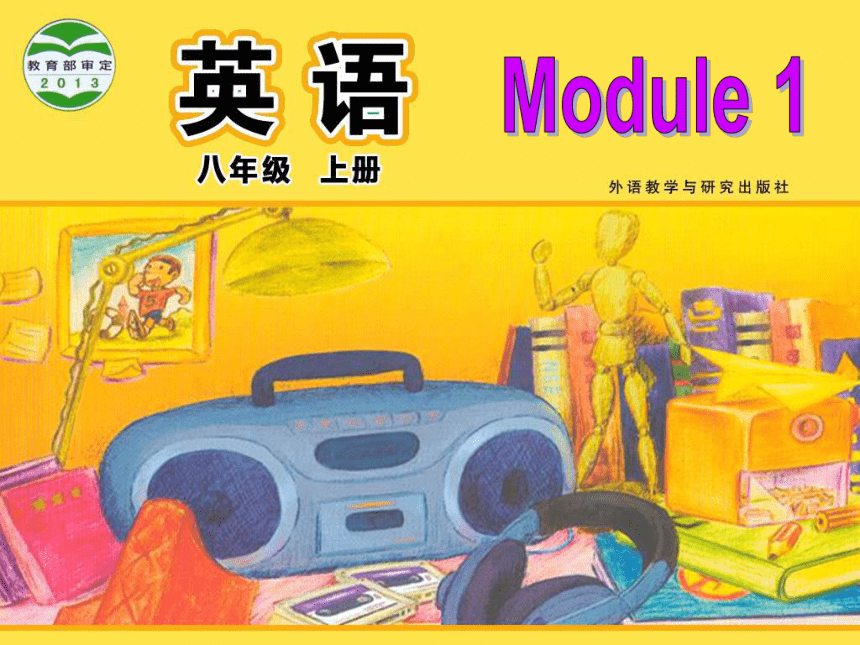 | |
| 格式 | zip | ||
| 文件大小 | 3.7MB | ||
| 资源类型 | 教案 | ||
| 版本资源 | 外研版 | ||
| 科目 | 英语 | ||
| 更新时间 | 2019-08-09 07:47:06 | ||
图片预览



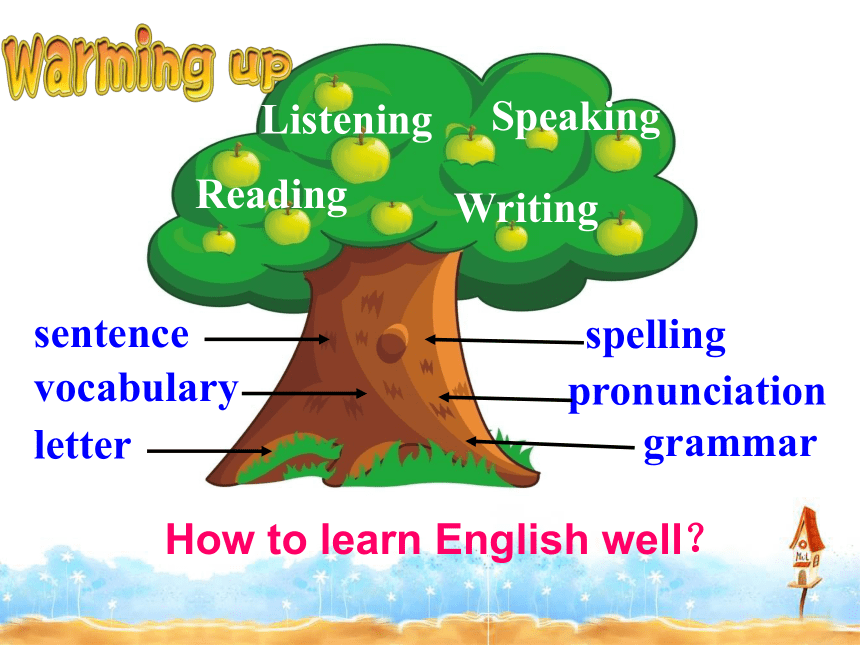
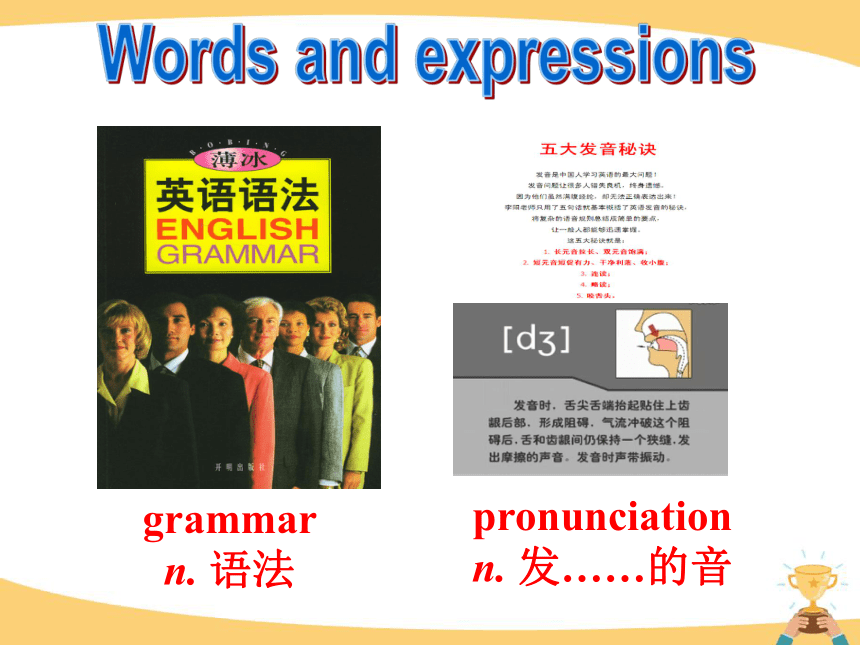
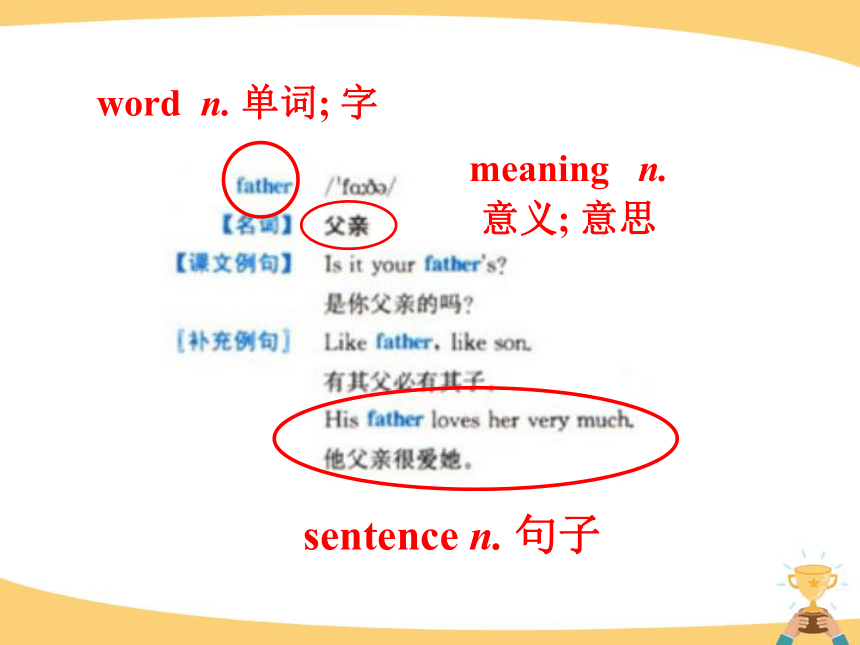
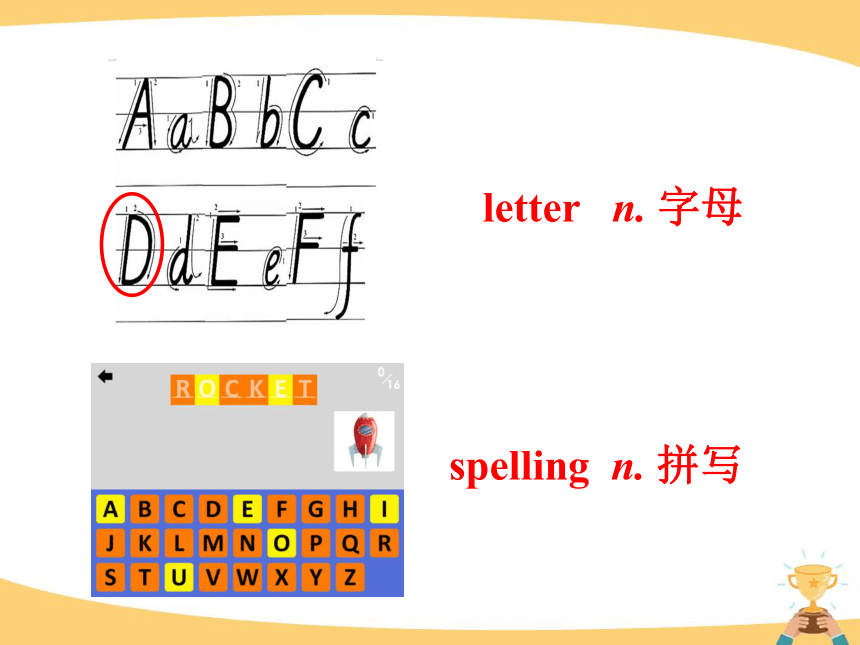
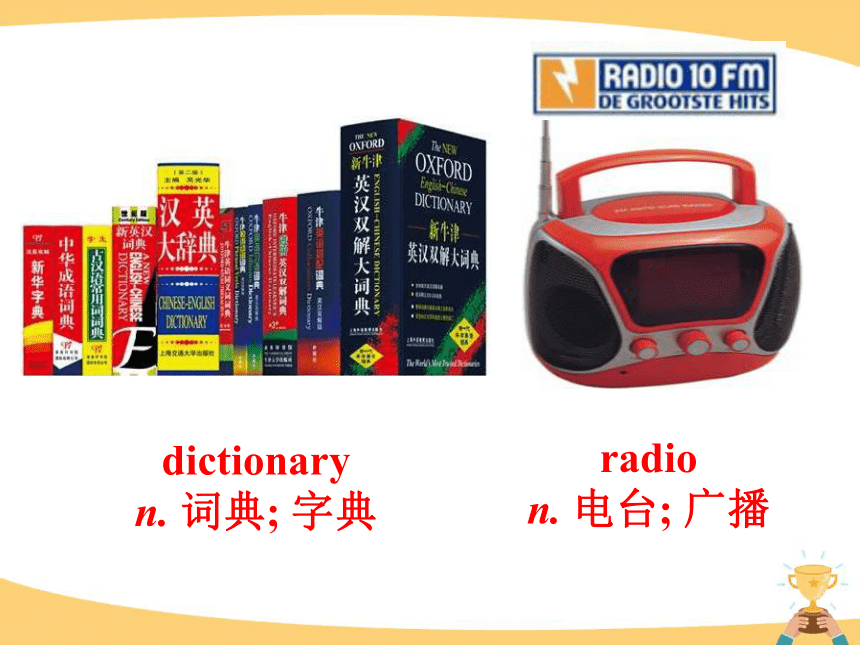

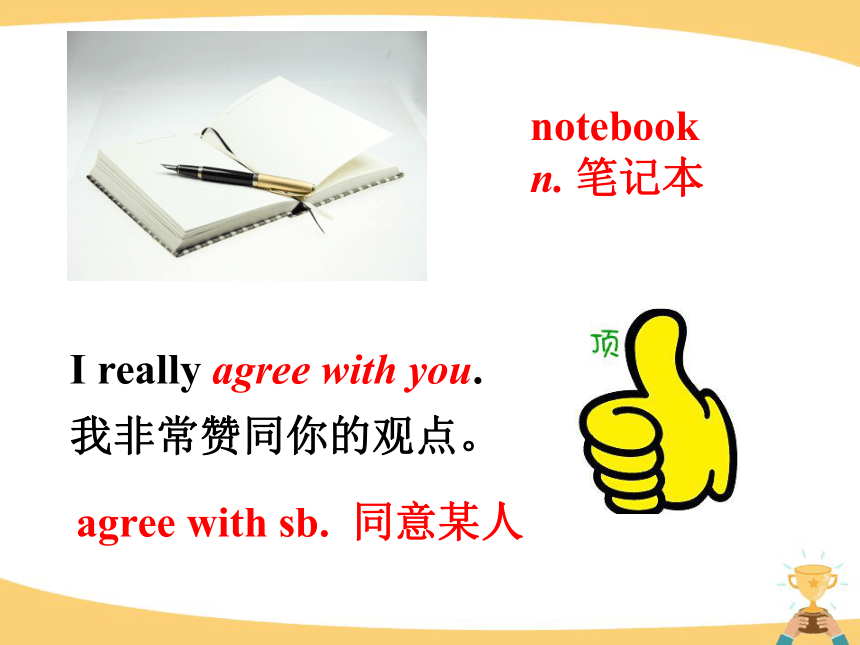
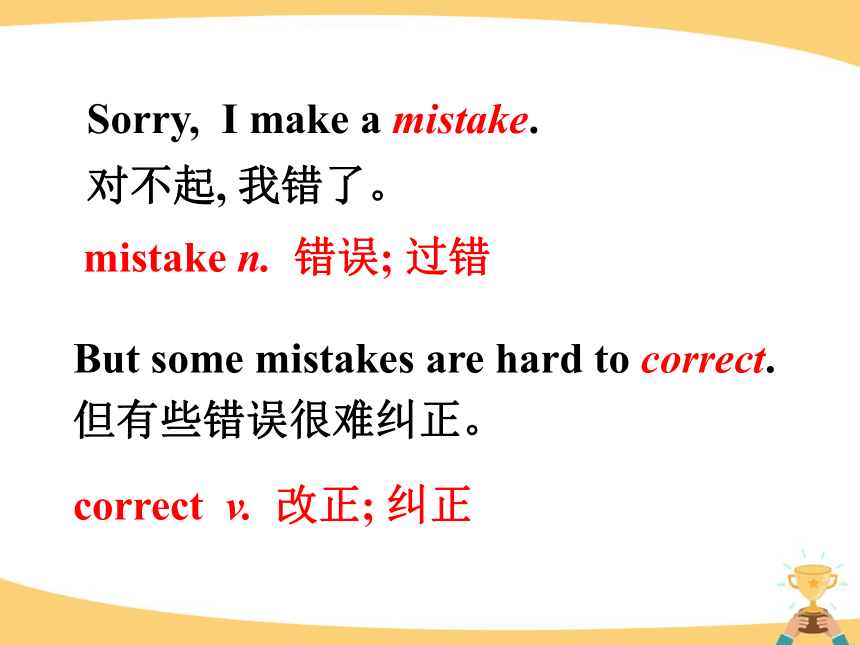
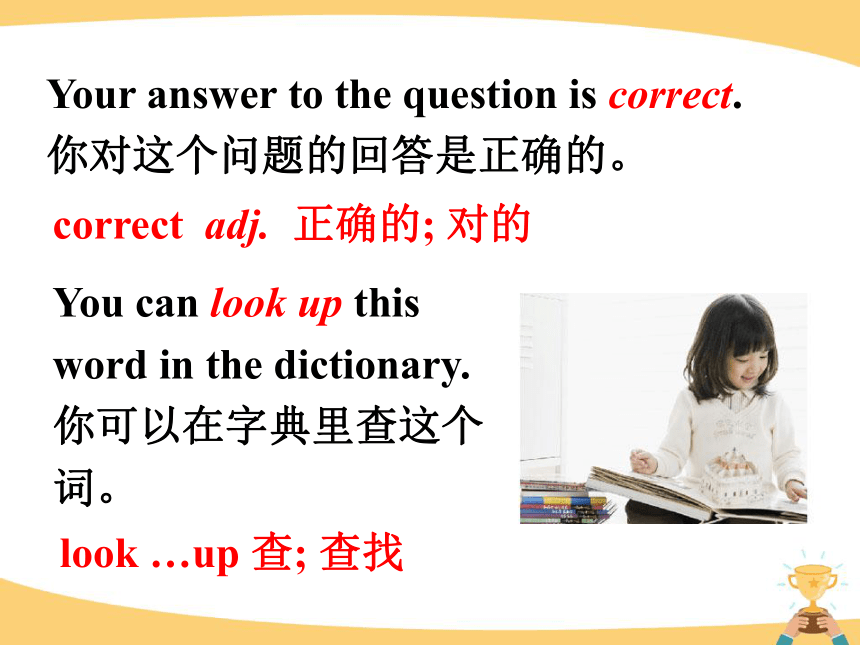
文档简介
课件51张PPT。Module 1Module 1
How to learn EnglishUnit 1
Let’s try to speak English
as much as possible.How to learn English well? ListeningSpeakingReadingWritinglettervocabularysentencegrammarpronunciationspellinggrammar
n. 语法pronunciation
n. 发……的音Words and expressionsword n. 单词; 字sentence n. 句子meaning n.
意义; 意思letter n. 字母spelling n. 拼写dictionary
n. 词典; 字典radio
n. 电台; 广播pair n. 两个人, 一对儿The newly married couple are really a happy pair. 那对新婚夫妇真是快乐的一对。 notebook
n. 笔记本agree with sb. 同意某人I really agree with you. 我非常赞同你的观点。mistake n. 错误; 过错Sorry, I make a mistake.
对不起, 我错了。But some mistakes are hard to correct.
但有些错误很难纠正。correct v. 改正; 纠正look …up 查; 查找You can look up this word in the dictionary. 你可以在字典里查这个词。 Your answer to the question is correct. 你对这个问题的回答是正确的。 correct adj. 正确的; 对的Jack practises the piano every day.
杰克每天练习弹钢琴。practise v. 练习I don’t understand what you are talking about.
我不明白你在说什么。understand-understood
v. 理解; 明白advice n. 意见; 建议You should give it a try. 你应该试一试。 should v. aux. 应该Is it possible to fix my computer?
我的电脑能修好吗?I will never forget it.
我将永远不会忘记。possible adj. 可能的forget-forgot v. 忘; 忘记He practises reading aloud every morning. 他每天早晨练习朗读。 The key factor to success is hard work. 成功的关键因素是努力工作。 aloud adv. 大声地; 出声地key adj. 关键性的, 非常重要的We can sum up the main point of the lesson in three sentences. 我们可以用三句话来概括本课要点。 She is an excellent teacher. 她是一位出色的教师。 main adj. 主要的; 最大的excellent adj. 极好的; 优秀的Read the instructions and check(√) the ones you understand.
1. Work in pairs. Ask and answer the
questions.
2. Correct the spelling.
3. Listen and check the words you hear.
4. Practise saying the words.
5. Match the words with their meanings.
6. Complete the sentences with the
words in the box.2. What mistake did Lingling make?
3. How does Daming usually check the spelling of a word?
4. Why was it difficult for Daming to check the spelling of cinema?She made a grammar mistake. She said “go” instead of “went”.He looks it up in the dictionary.Because he didn’t know the first letter.We should always speak English in class.
Let’s try to speak English as much as possible.Let’s talk about good ways to learn English.Why not write down our mistakes in our notebooks? Don’t forget to write down the correct answers next to the mistakes. It’s a good idea to spell and pronounce new words aloud every day.How about listening to the radio or reading English stories?Why don’t we try to find some English pen friends? We can write to them.Listening: listen to the radio
Speaking:
Reading:
always speak English in class/try to speak English as much as possible; listen to the radioNow write notes about learning English. just need to understand key
words and main ideas; read English
stories try to find some English pen friends and write to them
spell and
pronounce new words aloud every dayLearning new words: Writing: Everyday EnglishReady?
That’s a good idea.
What else?
Thanks a lot.
Excellent!1. Practise saying the words.
practise用作动词,意为“练习”,后
面可跟名词、代词或动词-ing形式作
宾语。如:
John is practising tennis in the
playground.
Peter likes basketball very much. He
practises it every day.Susan often practises singing in the
park.
【运用】根据句意从括号内选出一个适
当形式补全句子。
Simon is practising _________(to speak
/ speaking) English in the classroom.speaking2. Well, I usually look it up in the dictionary.
look up是动词短语,可以表示“查;查找”。如果其宾语为名词,可放在up之前或之后;如果其宾语为代词,只能放在look与up之间。如:
Please look up the time of your plane. = Please look the time of your plane up.
If you don’t know the word, you can look it up in the dictionary.【运用】根据汉语意思完成英语句子, 每
空词数不限。
我在这本书里查不到这个新单词。我想
试着在那本书里查找它。
I can’t ____________________ in this
book. I would like to try to __________
in that book.look it uplook up the new word3. Why not write down our mistakes in our notebooks?
Why not …? 用来表示提出某种建议, 而不是询问为什么不做某事的原因。
e.g. ________ take a walk in the park?
为什么不在公园里散散步?Why not我们还可以用下面的表达方式来提建议:
__________ we drive to the country?
我们为什么不开车去乡下?
________________ going to Europe for a holiday? 去欧洲度假怎么样?
write down 或者put down 表示“记下, 写下”。Why don’tWhat/How aboute.g. I’ll __________ the prices on a piece
of paper.
我会把价钱记在一张纸上。
________________ your ideas in your
notebook?
为什么不把你的想法记在笔记本上?write downWhy not put down4. And don’t forget to write down the correct answers next to the mistakes. What else?
forget用作动词, 意为“忘; 忘记”, 常用于
两种结构中:
forget to do sth.意为“忘记要做某事(未
做)”。如:
I forgot to close the window yesterday. forget doing sth.意为“忘记做过某事(已
做)”。如:
My mother forgot giving me a watch as a
birthday present last year.
【运用】根据句意用括号内所给单词的适
当形式填空。
(1) Don’t forget ________(take) your mobile
phone when you go shopping.
(2) Amy forgot ________(tell) me the news yesterday, so she told me again this morning.tellingto takeelse 通常用在疑问词后面, 可以表示“另外的, 别的”。例如:
We have said we’re sorry. _________ can we say?
我们已经道过歉了, 还能说些什么呢?
If I can’t trust you, ________ can I trust?
如果不能相信你, 我还能相信谁呢?What elsewho else5. I agree with you.
agree用作动词,意为“赞同”,有两种
常见用法:
agree with sb.意为“同意某人”。如:
I agree with you, Dad.
agree to do sth.意为“同意做某事”。
如: David agreed to have lunch in that
restaurant.【运用】根据汉语意思完成英语句子,
每空一词。
(1) 我总是同意西蒙。
I always ______ _____ Simon.
(2) 昨天他们同意再见面。
Yesterday they _______ ____ meet
again.agreed toagree with?Here is my (1) advice / notebook on learning English. Speak English (2) always / as much as possible in class, and listen to English (3) in the newspaper / on the radio. Underline the correct words and expressions.I (4) agree / forget it is a good idea to look up new words in the ( 5) notebook / dictionary. You can find the (6) correct / excellent pronunciation and learn the meaning.Pronunciation
and speaking1. We should always speak English in class.
2. Let’s try to speak English as much as
possible.
3. Why not write down our mistakes in our
notebooks?
4. It’s a good idea to spell and pronounce
new words aloud.
5. How about listening to the radio?
Now listen again and repeat.Listen and mark the intonation.Talk about problems in learning English and give advice.
Problems Advice
I can’t… How / What about …?
I don’t know… Why don’t you / not…?
— I can’t speak English well. What should
I do?
— Why don’t you try to talk to our
classmates in English?Work in pairs.完成句子。
1. 我将给你们一些学英语的建议。
I’m going to __________________ about studying English.
2. 课堂上你应该总是说英语。
You __________________ English in class.
3. 我和我的笔友互相发电子邮件。
My pen friend and I ______________ each other. give you some advice
should always speak
send e-mails to 4. 不要忘记每天检查你的词汇本。
__________________ your vocabulary notebook every day.
5. 尽量不要逐字翻译。
_________________ every word.
6. 为什么不把你的正确拼写写在错误旁边呢?
__________________ the correct spelling next to the mistakes?Don’t forget to check
Try not to translate
Why not write down 7. 你还想知道别的什么事?
_________ do you want to know?
8. 我完全同意你的意见。
I quite __________ you.
9. 我认为写与读一样重要。
I think writing is _____________
reading.What else
agree with
as important as Write a letter to your friend and tell him/her some good ways about learning English.
How to learn EnglishUnit 1
Let’s try to speak English
as much as possible.How to learn English well? ListeningSpeakingReadingWritinglettervocabularysentencegrammarpronunciationspellinggrammar
n. 语法pronunciation
n. 发……的音Words and expressionsword n. 单词; 字sentence n. 句子meaning n.
意义; 意思letter n. 字母spelling n. 拼写dictionary
n. 词典; 字典radio
n. 电台; 广播pair n. 两个人, 一对儿The newly married couple are really a happy pair. 那对新婚夫妇真是快乐的一对。 notebook
n. 笔记本agree with sb. 同意某人I really agree with you. 我非常赞同你的观点。mistake n. 错误; 过错Sorry, I make a mistake.
对不起, 我错了。But some mistakes are hard to correct.
但有些错误很难纠正。correct v. 改正; 纠正look …up 查; 查找You can look up this word in the dictionary. 你可以在字典里查这个词。 Your answer to the question is correct. 你对这个问题的回答是正确的。 correct adj. 正确的; 对的Jack practises the piano every day.
杰克每天练习弹钢琴。practise v. 练习I don’t understand what you are talking about.
我不明白你在说什么。understand-understood
v. 理解; 明白advice n. 意见; 建议You should give it a try. 你应该试一试。 should v. aux. 应该Is it possible to fix my computer?
我的电脑能修好吗?I will never forget it.
我将永远不会忘记。possible adj. 可能的forget-forgot v. 忘; 忘记He practises reading aloud every morning. 他每天早晨练习朗读。 The key factor to success is hard work. 成功的关键因素是努力工作。 aloud adv. 大声地; 出声地key adj. 关键性的, 非常重要的We can sum up the main point of the lesson in three sentences. 我们可以用三句话来概括本课要点。 She is an excellent teacher. 她是一位出色的教师。 main adj. 主要的; 最大的excellent adj. 极好的; 优秀的Read the instructions and check(√) the ones you understand.
1. Work in pairs. Ask and answer the
questions.
2. Correct the spelling.
3. Listen and check the words you hear.
4. Practise saying the words.
5. Match the words with their meanings.
6. Complete the sentences with the
words in the box.2. What mistake did Lingling make?
3. How does Daming usually check the spelling of a word?
4. Why was it difficult for Daming to check the spelling of cinema?She made a grammar mistake. She said “go” instead of “went”.He looks it up in the dictionary.Because he didn’t know the first letter.We should always speak English in class.
Let’s try to speak English as much as possible.Let’s talk about good ways to learn English.Why not write down our mistakes in our notebooks? Don’t forget to write down the correct answers next to the mistakes. It’s a good idea to spell and pronounce new words aloud every day.How about listening to the radio or reading English stories?Why don’t we try to find some English pen friends? We can write to them.Listening: listen to the radio
Speaking:
Reading:
always speak English in class/try to speak English as much as possible; listen to the radioNow write notes about learning English. just need to understand key
words and main ideas; read English
stories try to find some English pen friends and write to them
spell and
pronounce new words aloud every dayLearning new words: Writing: Everyday EnglishReady?
That’s a good idea.
What else?
Thanks a lot.
Excellent!1. Practise saying the words.
practise用作动词,意为“练习”,后
面可跟名词、代词或动词-ing形式作
宾语。如:
John is practising tennis in the
playground.
Peter likes basketball very much. He
practises it every day.Susan often practises singing in the
park.
【运用】根据句意从括号内选出一个适
当形式补全句子。
Simon is practising _________(to speak
/ speaking) English in the classroom.speaking2. Well, I usually look it up in the dictionary.
look up是动词短语,可以表示“查;查找”。如果其宾语为名词,可放在up之前或之后;如果其宾语为代词,只能放在look与up之间。如:
Please look up the time of your plane. = Please look the time of your plane up.
If you don’t know the word, you can look it up in the dictionary.【运用】根据汉语意思完成英语句子, 每
空词数不限。
我在这本书里查不到这个新单词。我想
试着在那本书里查找它。
I can’t ____________________ in this
book. I would like to try to __________
in that book.look it uplook up the new word3. Why not write down our mistakes in our notebooks?
Why not …? 用来表示提出某种建议, 而不是询问为什么不做某事的原因。
e.g. ________ take a walk in the park?
为什么不在公园里散散步?Why not我们还可以用下面的表达方式来提建议:
__________ we drive to the country?
我们为什么不开车去乡下?
________________ going to Europe for a holiday? 去欧洲度假怎么样?
write down 或者put down 表示“记下, 写下”。Why don’tWhat/How aboute.g. I’ll __________ the prices on a piece
of paper.
我会把价钱记在一张纸上。
________________ your ideas in your
notebook?
为什么不把你的想法记在笔记本上?write downWhy not put down4. And don’t forget to write down the correct answers next to the mistakes. What else?
forget用作动词, 意为“忘; 忘记”, 常用于
两种结构中:
forget to do sth.意为“忘记要做某事(未
做)”。如:
I forgot to close the window yesterday. forget doing sth.意为“忘记做过某事(已
做)”。如:
My mother forgot giving me a watch as a
birthday present last year.
【运用】根据句意用括号内所给单词的适
当形式填空。
(1) Don’t forget ________(take) your mobile
phone when you go shopping.
(2) Amy forgot ________(tell) me the news yesterday, so she told me again this morning.tellingto takeelse 通常用在疑问词后面, 可以表示“另外的, 别的”。例如:
We have said we’re sorry. _________ can we say?
我们已经道过歉了, 还能说些什么呢?
If I can’t trust you, ________ can I trust?
如果不能相信你, 我还能相信谁呢?What elsewho else5. I agree with you.
agree用作动词,意为“赞同”,有两种
常见用法:
agree with sb.意为“同意某人”。如:
I agree with you, Dad.
agree to do sth.意为“同意做某事”。
如: David agreed to have lunch in that
restaurant.【运用】根据汉语意思完成英语句子,
每空一词。
(1) 我总是同意西蒙。
I always ______ _____ Simon.
(2) 昨天他们同意再见面。
Yesterday they _______ ____ meet
again.agreed toagree with?Here is my (1) advice / notebook on learning English. Speak English (2) always / as much as possible in class, and listen to English (3) in the newspaper / on the radio. Underline the correct words and expressions.I (4) agree / forget it is a good idea to look up new words in the ( 5) notebook / dictionary. You can find the (6) correct / excellent pronunciation and learn the meaning.Pronunciation
and speaking1. We should always speak English in class.
2. Let’s try to speak English as much as
possible.
3. Why not write down our mistakes in our
notebooks?
4. It’s a good idea to spell and pronounce
new words aloud.
5. How about listening to the radio?
Now listen again and repeat.Listen and mark the intonation.Talk about problems in learning English and give advice.
Problems Advice
I can’t… How / What about …?
I don’t know… Why don’t you / not…?
— I can’t speak English well. What should
I do?
— Why don’t you try to talk to our
classmates in English?Work in pairs.完成句子。
1. 我将给你们一些学英语的建议。
I’m going to __________________ about studying English.
2. 课堂上你应该总是说英语。
You __________________ English in class.
3. 我和我的笔友互相发电子邮件。
My pen friend and I ______________ each other. give you some advice
should always speak
send e-mails to 4. 不要忘记每天检查你的词汇本。
__________________ your vocabulary notebook every day.
5. 尽量不要逐字翻译。
_________________ every word.
6. 为什么不把你的正确拼写写在错误旁边呢?
__________________ the correct spelling next to the mistakes?Don’t forget to check
Try not to translate
Why not write down 7. 你还想知道别的什么事?
_________ do you want to know?
8. 我完全同意你的意见。
I quite __________ you.
9. 我认为写与读一样重要。
I think writing is _____________
reading.What else
agree with
as important as Write a letter to your friend and tell him/her some good ways about learning English.
同课章节目录
- Module 1 How to learn English
- Unit 1 Let's try to speak English as much as possi
- Unit 2 You should smile at her.
- Unit 3 Language in use .
- Module 2 My home town and my country
- Unit 1 It's taller than many other buildings.
- Unit 2 Cambridge is a beautiful city in the east o
- Unit 3 Language in use .
- Module 3 Sports.
- Unit 1 Nothing is more exciting than playing tenni
- Unit 2 This year we training more carefully.
- Unit 3 Language in use .
- Module 4 Planes, ships and trains .
- Unit 1 He lives the farthest from school.
- Unit 2 What is the best way to travel.
- Unit 3 Language in use .
- Module 5 Lao She Teahouse.
- Unit 1 I wanted to see the Beijing Opera.
- Unit 2 It descibes the changes in Chinese society.
- Unit 3 Language in use .
- Module 6 Animals in danger.
- Unit 1 It allows people to get closer to them .
- Unit 2 The WWF is working hard to save them all.
- Unit 3 Language in use .
- Revision module A
- Module 7 A famous story
- Unit 1 Alice was sitting with her sister by the ri
- Unit 2 She was thinking about her cat.
- Unit 3 Language in use .
- Module 8 Accidents
- Unit 1 While the car were changing to red, a car s
- Unit 2 I was trying to pick it up when it bite me
- Unit 3 Language in use .
- Module 9 Population
- Unit 1 The population of China is about 1.37 billi
- Unit 2 Arnwick was a city with 200,000 people.
- Unit 3 Language in use .
- Module 10 The weathe
- Unit 1 It might snow.
- Unit 2 The weather is fine all year round.
- Unit 3 Language in use .
- Module 11 Way of life
- Unit 1 In China ,we open a gift later.
- Unit 2 In England, you usually drink tea with milk
- Unit 3 Language in use .
- Module 12 Help
- Unit 1 What should we do before help arrives?
- Unit 2 Stay away from windows and heavy furniture.
- Unit 3 Language in use .
- Revision module B
